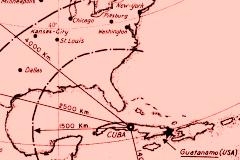60 years of the Cuban missile crisis
The world holds its breath: When in October 1962 the Soviet Union built missile facilities on Cuba for intermediate-range missiles which could have reached Washington and the United States headed for open confrontation, the world came close to a third and nuclear world war.
A nuclear war, even Switzerland would not be spared
Although neither of the states involved wanted to enter war, the political power game between U. S. President John F. Kennedy and the First Secretary of the Communist Party of the Soviet Union Nikita Khrushchev «raised the risks of ‹war by accident› drastically», as the intelligence service of the Swiss Army reasoned (dodis.ch/30211, originally in French). «The current situation is so serious», the Secretary of State Dean Rusk confided to the Swiss ambassador in Washington, August R. Lindt, «that even your country might be affected» (dodis.ch/19007, originally in German).
Swiss diplomats play a key role
In this tense situation, the Swiss diplomats found themselves in a key position: since 1961 (and until the year 2015) Switzerland represented the U. S. interests in communist Cuba (cf. e-dossier dodis.ch/W5724) . In fact, the U. S. asked the Swiss ambassador in Havanna, Emil Stadelhofer, for an intervention with the Prime Minister of Cuba, Fidel Castro. The crisis was eventually solved through direct contacts between Washington and Moscow. Stadelhofer, however, organized the repatriation of the body of Rudolf Anderson (dodis.ch/30382). The pilot of a spy plane of the U. S. Air Force that was shot down while flying over Cuba was the only casualty of a crises, which nearly turned into a nuclear war 50 years ago.
Valuable testimonies to the East-West conflict
The permalinks refer to the original documents from the Federal Archives, which are reproduced as pdf-facsimiles and are online accessible on Dodis. During the Cuban missile crisis the Cold War, due to the direct confrontation between the super powers, was in its «hottest phase». The reports of the Swiss diplomats, who had privileged access to the United States because the Swiss representation of American interest in Cuba, are a valuable testimony of the events from the heart of this confrontation between East and West.
